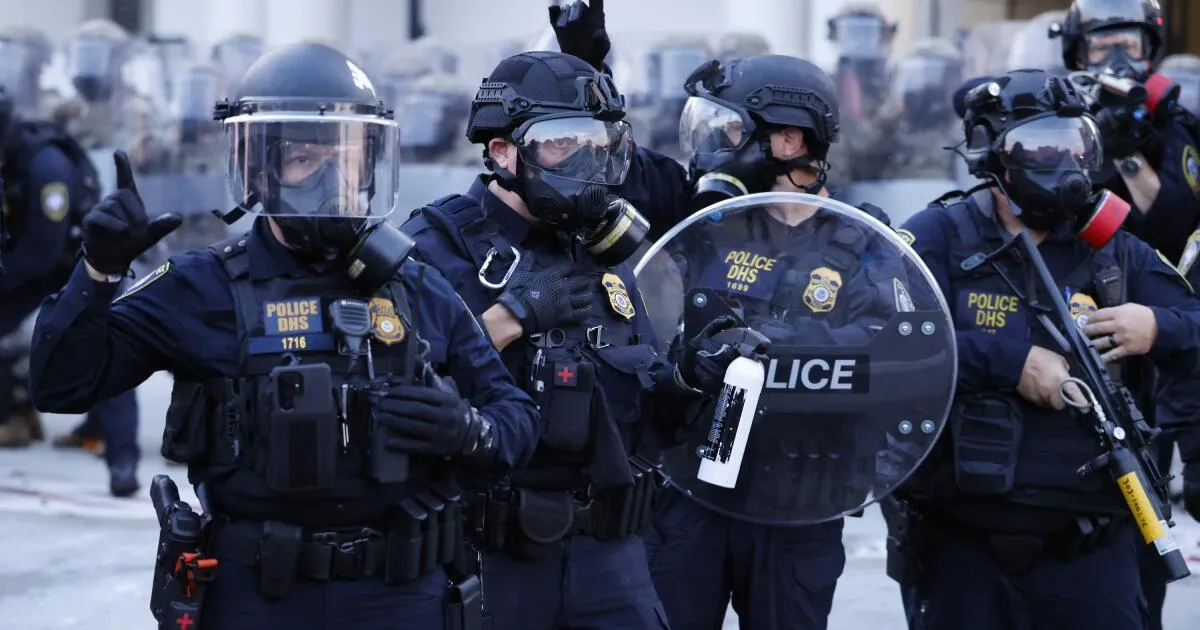
Fifty years ago, a landmark decision by the Supreme Court unanimously concluded that U.S. Border Patrol agents had violated the Constitution by stopping a vehicle on a freeway near San Clemente, California. The justices ruled that stopping the car simply because its occupants appeared to be “of Mexican ancestry” was a violation of the 4th Amendment, which protects Americans from unreasonable searches. The ruling emphasized that a motorist’s “Mexican appearance” does not provide sufficient grounds for questioning their immigration status.
However, in a significant reversal, the Supreme Court issued a ruling on Monday that favored the Trump administration, allowing law enforcement to stop and question individuals based on their perceived ethnicity. In a 6-3 vote, the justices set aside a Los Angeles judge's temporary restraining order that prohibited agents from stopping individuals based on race or apparent ethnicity. Justice Brett M. Kavanaugh stated, “Apparent ethnicity alone cannot furnish reasonable suspicion. However, it can be a relevant factor when considered along with other salient factors.”
Critics of the ruling have expressed alarm, arguing that it opens the door for racial and ethnic bias in law enforcement practices. Ahilan Arulanantham, a UCLA law professor, described the decision as “shocking and appalling,” noting that there hasn't been a recent ruling that explicitly authorized racial discrimination. He highlighted that Kavanaugh’s opinion represents only his view and that the full court provided no comprehensive explanation for a case that was processed through its emergency docket.
In stark contrast, the Supreme Court under Chief Justice John G. Roberts Jr. had previously ruled against using race or ethnicity as a factor in college admissions. In a 2023 decision that struck down affirmative action policies at Harvard and the University of North Carolina, Roberts wrote, “Eliminating racial discrimination means eliminating all of it.” This juxtaposition raises questions about the consistency of the Court’s stance on racial issues.
Reports have surfaced indicating that ICE agents have confronted U.S. citizens and lawful permanent residents without allowing them to first confirm their immigration status. This alarming trend has prompted many individuals to carry identification at all times. For instance, an incident in New York involved a man outside a federal court being pushed by ICE agents before he could present his identification, although he was ultimately released.
When questioned about rising fears among U.S. citizens regarding potential ICE raids following the ruling, White House Press Secretary Karoline Leavitt assured that individuals should not be worried. Leavitt stated that immigration agents conduct targeted operations based on law enforcement intelligence. “The Supreme Court upheld the Trump administration’s right to stop individuals in Los Angeles to briefly question them regarding their legal status, because the law allows this and has been the practice of the federal government for decades,” she explained.
Leavitt emphasized that the Immigration and Nationality Act permits immigration officers to briefly stop an individual to inquire about their immigration status if there is reasonable suspicion. She clarified that reasonable suspicion is determined by a combination of factors, not solely based on race. This point was echoed by Tom Homan, the White House border advisor, who stated that accusations of racial profiling are unfounded. “We don’t arrest somebody or detain somebody without reasonable suspicion,” Homan asserted during an interview with MSNBC.
Justice Sonia Sotomayor, in her dissent, highlighted that nearly half of the residents in Greater Los Angeles are Latino and many speak Spanish. She expressed concern that countless individuals in the region have been subjected to undue harassment based on their appearance, accents, and occupations. “Today, the Court needlessly subjects countless more to these exact same indignities,” she warned.
The core issue in this case revolved around the definition of “reasonable suspicion.” Historically, the Supreme Court has maintained that law enforcement may stop and question individuals if there are specific indicators suggesting legal violations. The primary contention was whether agents could stop individuals who appear to be Latino and work in low-wage jobs, such as day laborers or at car washes. The court ruled in favor of allowing stops based on the “totality of the circumstances,” which may include ethnicity along with other contextual factors.
The implications of this ruling are significant, as they could reshape the landscape of immigration enforcement and the treatment of individuals who may be perceived as undocumented based on their appearance. As the legal and social conversations surrounding this decision continue, the debate over immigration policy and civil rights remains at the forefront of national discourse.